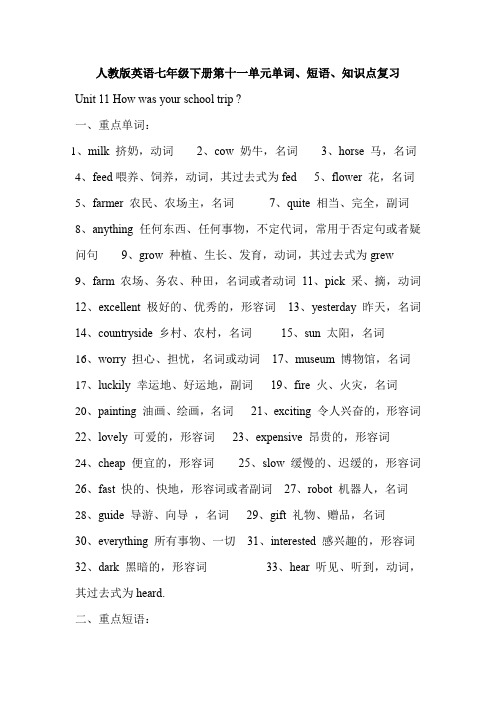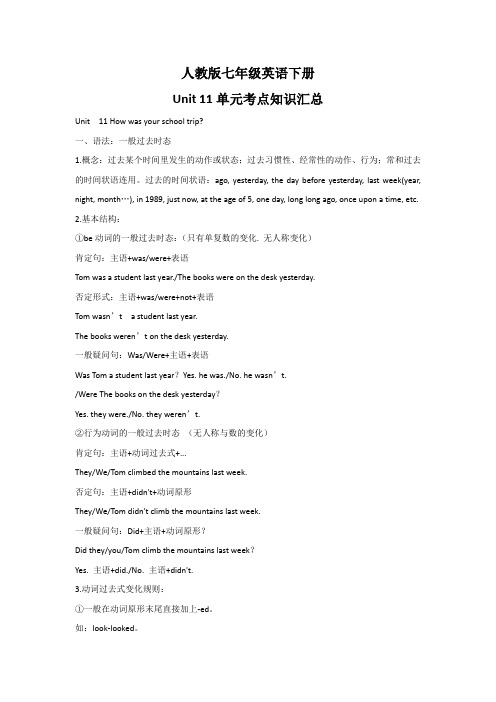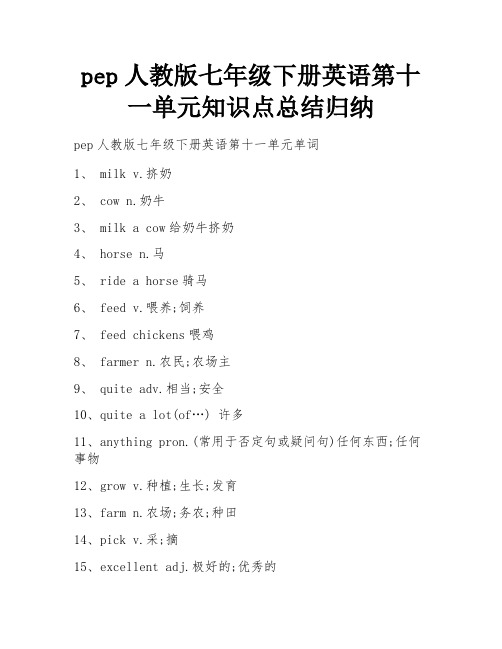人教版七年级英语下册第十一单元知识点总结归纳
人教版英语七年级下册第十一单元单词、短语、知识点清单

人教版英语七年级下册第十一单元单词、短语、知识点复习Unit 11 How was your school trip ?一、重点单词:1、milk 挤奶,动词2、cow 奶牛,名词3、horse 马,名词4、feed喂养、饲养,动词,其过去式为fed5、flower 花,名词5、farmer 农民、农场主,名词7、quite 相当、完全,副词8、anything 任何东西、任何事物,不定代词,常用于否定句或者疑问句9、grow 种植、生长、发育,动词,其过去式为grew9、farm 农场、务农、种田,名词或者动词11、pick 采、摘,动词12、excellent 极好的、优秀的,形容词13、yesterday 昨天,名词14、countryside 乡村、农村,名词15、sun 太阳,名词16、worry 担心、担忧,名词或动词17、museum 博物馆,名词17、luckily 幸运地、好运地,副词19、fire 火、火灾,名词20、painting 油画、绘画,名词21、exciting 令人兴奋的,形容词22、lovely 可爱的,形容词23、expensive 昂贵的,形容词24、cheap 便宜的,形容词25、slow 缓慢的、迟缓的,形容词26、fast 快的、快地,形容词或者副词27、robot 机器人,名词28、guide 导游、向导,名词29、gift 礼物、赠品,名词30、everything 所有事物、一切31、interested 感兴趣的,形容词32、dark 黑暗的,形容词33、hear 听见、听到,动词,其过去式为heard.二、重点短语:1、milk a cow 给奶牛挤奶2、ride a horse 骑马2、feed chicken喂鸡4、quite a lot (of) 许多。
6、in the countryside 在乡下、在农村6、fire station 消防站7、all in all 总的来说8、be interested in ... 对。
人教版七年级英语下册Unit 11单元考点知识汇总

人教版七年级英语下册Unit 11单元考点知识汇总Unit 11 How was your school trip?一、语法:一般过去时态1.概念:过去某个时间里发生的动作或状态;过去习惯性、经常性的动作、行为;常和过去的时间状语连用。
过去的时间状语:ago, yesterday, the day before yesterday, last week(year, night, month…), in 1989, just now, at the age of 5, one day, long long ago, once upon a time, etc.2.基本结构:①be动词的一般过去时态:(只有单复数的变化. 无人称变化)肯定句:主语+was/were+表语Tom was a student last year./The books were on the desk yesterday.否定形式:主语+was/were+not+表语Tom wasn’t a student last year.The books weren’t on the desk yesterday.一般疑问句:Was/Were+主语+表语Was Tom a student last year?Yes. he was./No. he wasn’t./Were The books on the desk yesterday?Yes. they were./No. they weren’t.②行为动词的一般过去时态(无人称与数的变化)肯定句:主语+动词过去式+...They/We/Tom climbed the mountains last week.否定句:主语+didn't+动词原形They/We/Tom didn't climb the mountains last week.一般疑问句:Did+主语+动词原形?Did they/you/Tom climb the mountains last week?Yes. 主语+did./No. 主语+didn't.3.动词过去式变化规则:①一般在动词原形末尾直接加上-ed。
人教版 英语 七年级下册 11单元知识点笔记

Unit111.一般过去时意义:表示过去某个时间里发生的动作或存在的状态。
结构:v +ed时间标志词:1.yesterday 昨天,the day before yesterday 前天,in the past在过去,just now 刚才st+时间,last week, 上周,last year 去年,last month 上个月3.时间+ago, 3 days ago 三天前,a year ago 一年以前,one hour ago 一小时前4.in+ 过去的年,月。
In 2017, 在2017年动词原形变过去式的变化规则:1)一般情况加ed look----looked play----played2) 以e结尾的,直接加d, live- lived use---used3) 以辅音字母加y结尾的,变y为i, 再加ed, study---studied, worry---worried4) 以辅元辅,重读闭音节结尾的,双写最后一个字母,再加ed, stop—stopped,5)不规则变化,have-had, is—was, are---were, do---did, go- went, come---came,注意:ed的读音,以清辅音加ed的读/t/, 如look—looked /lukt/以浊辅音或元音加ed的读/d/,如live---lived /livd/play—played /pleid/2.过去式变一般疑问句,用Did来引导,后面动词变回原形。
例:I had much homework to do yesterday. --Did you have much homework to do yesterday?过去式变否定句,在动词前加didn’t, 后面动词变回原形。
例:I did my homework just now.--- I didn’t do my homework just now.注意:如果be动词是过去式,变一般疑问句,直接把be动词提前大写,变否定句,直接在be动词后加not, 通常缩写为wasn’t, weren’t.3.Did you…. 的回答:Yes,I did. No, I didn’t.Did she….的回答:Yes, she did. No, she didn’t.Did they….的回答:Yes, they did. No, they didn’t.Was he….的回答:Yes, he was. No, he wasn’t.Were you….的回答:Yes, I was. No, I wasn’t.Were they….的回答:Yes, they were. No, they weren’t.4.Something 和anything 的区别:肯定句用something,否定句或疑问句中用anything.I would like something to drink.I don’t have anything. Is there anything on the desk?用法:1.something, anything叫做复合不定代词,作主语,谓语用单数。
人教版七年级下册unit 11单元考点归纳

期末复习参考--人教版七年级下册unit 11重点内容归纳【知识归纳】1、It’s+形容词+to do sth.做某事是…的In some places, it isn’t polite to look at people when you talk.在一些地方,当你说话的时候看着人是不礼貌的。
It’s very kind of you to help me.你能帮我,真好。
It’s difficult for us to finish the work.对我们来说,完成这项工作很难。
【探究总结】It’s +形容词+ to do sth.句型(1)在英语中,如果作主语的动词不定式太长,为了避免头重脚轻,一般用it作形式主语,而将真正的主语置于句尾。
(2)It is+形容词+of sb. + to do sth.形容词描述行为者的性格品质如kind, nice, polite等.It is+形容词+for sb. + to do sth.形容词描述事物的特征、性质如easy, interesting等.例如:It’s kind of you to help me.帮助我,你是善良的It’s important for us to help others when they are in trouble.当别人处于困境时,对于我们来说,帮助他们是重要的2、bring v. (brought)带来You cannot bring food or drink into the lab.你不能把食物和饮料带进实验室。
【探究总结】bring的用法(1)bring作动词用,意为“带来”,其过去式为brought常构成短语:bring sb. sth. = bring sth. to sb.意为“给某人带来某物”bring up意为“养育”。
(2)bring, take, carry与get的用法辨析:bring表示从别处把某人或物“带来”或“拿来”take指把某人或物“带走”或“拿走”(到别处)carry指“搬运”,不具体说明来去的方向,有时含有沉重或麻烦之意get指到别处把某物取来,相当于go and bring3、each pron.各个,每个In the US some people shake hands, and some kiss or hug each other.在美国,有些人握手,有些人亲吻或彼此拥抱。
人教版七年级下册 Unit 11知识点总结

七年级下册Unit 11知识点总结第一部分:重点单词1. milk 不可数名词,“牛奶”动词,“挤奶”milk a cow 给奶牛挤奶2. farm 名词,“农场”动词,“务农;种田”farmer 农民3. quite 副词,“相当;完全”修饰形容词副词,quite a lot 相当多拼写注意与quiet(安静的)的区分4. grow “种植”grow strawberries 种草莓动词“生长;发育”grow up 长大“增加;增长”The number of students wearing glasses grows.戴眼镜的学生数量增加了。
5. pick 动词“采摘”pick apples 摘苹果“选择;挑选”pick up “捡起;接电话;接某人“6. worry 动词&名词,“担心;担忧“worry about … 担心… worry sb. 使某人担心7. luckily 副词,“幸运地“unluckily 不幸地lucky 幸运的(形容词)luck 幸运;运气(名词)8. exciting 形容词,“使人兴奋的;令人激动的“excited 感到激动的、兴奋的an exciting message 一个令人激动的消息He is excited to see his old friend.见到老朋友他很激动。
9. expensive 形容词,“昂贵的“cheap ”便宜的“10. slow 形容词,“缓慢的;迟缓的“slowly 缓慢地(副词)fast快地(的)动词,“减慢“slow down 减速慢行11. guide 名词,“导游,向导“动词,“指导“guide sb. to do … 指导某人做某事12. interested 形容词,“感兴趣的“be interested in … 对…感兴趣interesting 有趣的This is an interesting book. 这是一本有趣的书。
pep人教版七年级下册英语第十一单元知识点总结归纳

pep人教版七年级下册英语第十一单元知识点总结归纳pep人教版七年级下册英语第十一单元单词1、 milk v.挤奶2、 cow n.奶牛3、 milk a cow给奶牛挤奶4、 horse n.马5、 ride a horse骑马6、 feed v.喂养;饲养7、 feed chickens喂鸡8、 farmer n.农民;农场主9、 quite adv.相当;安全10、quite a lot(of…) 许多11、anything pron.(常用于否定句或疑问句)任何东西;任何事物12、grow v.种植;生长;发育13、farm n.农场;务农;种田14、pick v.采;摘15、excellent adj.极好的;优秀的16、countryside n.乡村;农村17、in the countryside在乡下;在农村18、yesterday n.昨天19、flower n.花20、worry v.担心;担忧21、luckily adv.幸运地;好运地22、sun n.太阳23、museum n.博物馆24、fire n.火灾25、fire station 消防站26、painting n.油画;绘画27、exciting adj.使人兴奋的;令人激动的28、lovely adj.可爱的29、expensive adj.昂贵的30、cheap adj.廉价的;便宜的31、slow adj.缓慢的;迟缓的32、fast adv&adj快地(的)33、robot n.机器人34、guide n.导游;向导35、gift n.礼物;赠品36、all in all总的说来37、everything pron一切;所有事物38、interested adj.感兴趣的39、be interested in对……感兴趣40、dark adj.黑暗的;昏暗的41、hear(heard) v.听到;听见42、carol卡罗尔(女名)pep人教版七年级下册英语第十一单元知识点◆短语归纳1. go for a walk 去散步2. milk a cow 挤牛奶3. ride a horse 骑马4. feed chickens 喂小鸡5. talk with 与……谈话6. take photos 拍照7. quite a lot 相当多8. show… around 带领……参观9. learn about 了解10. from… to… 从……到……11. grow strawberries 种植草莓12. pick strawberries 采草莓13. in the countryside 在乡下14. go fishing 去钓鱼15. at night 在夜晚16. a lot of 许多;大量17. e out 出来18. go on a school trip 去学校郊游19. along the way 沿线20. after that 之后21. buy sth. for sb. 为某人买某物22. all in all 总的来说23. take a / the train 乘火车24. be interested in 对……感兴趣25. not… at all 根本不……◆用法集萃1. how + be…? + like? ……怎么样?2. too many + 可数名词复数太多的……3. teach sb. how to do sth. 教某人怎样做某事4. quite + a / an + 形容词+可数名词单数 = a + very + 形容+可数名词单数一个相当 / 很……的......◆典句必背1. —how was your school trip? 你的学校郊游怎么样?—it was great! 好极了!2. —did you go to the zoo? 你去动物园了吗?—no, i didn’t. i went to a farm. 不,没有。
七下英语第十一单元知识点归纳
七下英语第十一单元知识点归纳七年级下册英语第十一单元主要包括以下几个知识点:一、动词的时态1.一般现在时:表示经常发生的动作、习惯、真理等。
2.现在进行时:表示现在正在进行的动作。
3.一般过去时:表示过去发生的动作或状态。
4.过去进行时:表示过去一些时间正在进行的动作。
5.一般将来时:表示将来要发生的动作或事件。
二、状语从句1.时间状语从句:用来表示动作或状态发生的时间。
2.地点状语从句:用来表示动作发生的地点。
3.原因状语从句:用来表示动作的原因。
4.结果状语从句:用来表示动作的结果。
5.条件状语从句:用来表示其中一种条件下发生的动作。
6.目的状语从句:用来表示一些动作的目的。
三、形容词和副词的比较级和最高级1.比较级:用来比较两个人或事物之间的差异。
2.最高级:用来比较三个或三个以上的人或事物之间的差异。
四、被动语态1. 被动语态的基本构成:be + 过去分词。
2.被动语态的用法:表示动作的承受者或行为的对象,强调动作的发生而不强调动作的执行者。
五、情态动词1. can:表示能力或许可。
2. must:表示必须或肯定。
3. may:表示可能或许可。
4. need:表示需要。
5. should:表示应该或建议。
6. would like:表示意愿。
六、宾语从句1.宾语从句是一种名词性从句,充当宾语的作用。
2. 宾语从句的引导词有that, if, whether等。
七、祈使句1.祈使句用来表示命令、请求、建议、劝告等。
2.没有主语,动词用原形。
以上就是七年级下册英语第十一单元的主要知识点归纳。
在学习中,我们要掌握动词的时态,熟练运用状语从句,掌握形容词和副词的比较级和最高级的用法,了解被动语态的构成和用法,掌握情态动词的用法,能够正确使用宾语从句和祈使句。
通过练习和巩固这些知识点,可以提高英语表达能力。
人教版七年级下册英语Unit11知识点
人教版七年级下册英语Unit11知识点Unit11名词:cow奶牛horse马XXX农民countryside乡村;农村动词:XXX挤奶feed喂养;饲养形容词:XXX可爱的XXX昂贵的cheap廉价的;便宜的副词:quite相当;完全代词:XXX任何东西;任何事物兼类词:farmn农场v务农;种田短语:milk a cow给奶牛挤奶ride a horse骑马feed chicken喂鸡quite a lot(of……)许多in the countryside在乡下;在农村XXX消防站常识点:1、milk牛奶(名词)→milk挤奶(动词)rain雨(名词)→rain下雨(动词)water水(名词)→water浇水(动词)plant植物(名词)→plant种植(动词)all in all总的说来be interested in对……感兴趣go for a walk = take a walk去漫步go on a trip = have a trip加入游览in the dark在黑暗中come out(太阳、星星、玉轮)呈现;暴露;出书worryv&n忧郁;担心XXX(的)everything所有事物;一切XXX昨天luckily幸运地;好运地slow迟钝的;迟钝的interested感兴趣的dark黑暗的;昏暗的excellent极好的;优秀的exciting使人兴奋动物;令人激动的pick采;摘XXX听到;听见grow种植;生长;发育flower花sun太阳XXXfire火;火警painting油画;绘画robot机器人guide导游;向导gift礼品;赠品2、feed豢养;豢养Can you help me feed my dog?你能帮我喂狗吗?(1)XXX……把……喂给……You can XXX.你可以把坚果喂给这个猴子吃。
(2)feed……(on)……用……喂……You can XXX(on)nuts.你可以用坚果喂猴子。
Unit11单元知识点归纳总结及配套练习-人教版英语七年级下册
Unit11 How was your school trip?Ⅰ. Revision(复习)Ⅱ. Presentation(重点,难点,考点,热点呈现)一般过去式1. 含义:表示动作或者状态发生在过去2.构成:肯定句:主语+动词过去式+ 其它如:I went home at nine o'clock yesterday.否定句:主语+didn't +动词原形+其它如:I didn't go home yesterday. He didn't tell me about you.疑问句:一般疑问句:Did +主语+动词原形+宾语如:Did you go home yesterday?Did you study in the school?肯定回答:Yes, I did. 否定回答:No, I didn't.特殊疑问句:特殊疑问词+did +主语+动词原型+宾语When did you finish your homework last night? What did you do the day before yesterday?3. 一般过去时态动词变化形式一般过去时态由动词的过去式表示。
大多数动词的过去式是在动词原形后加上ed构成。
这类动词称为规则动词。
1)一般情况下在词尾直接加ed。
如:play―played work―worked2)以e结尾的动词只加d. 如:like--- liked love―loved3)以辅音字母+Y结尾的动词,变Y为i,再加ed. 如:study―studied carry―carried 4)以重读闭音节结尾的动词,如果末尾只有一个辅音字母,要双写最后这个辅音字母,再加ed.如:stop―stopped5)不以ed 结尾的过去式,称为不规则动词,如:write --wrote go-went do-did have-had see-saw take-took make-made come-came buy-bought4. 标志词。
人教版七年级英语下册Unit11Howwasyourschooltrip单元知识点汇总
Unit 11 How was your school trip?Period 1 Section A (1a-2d)必背单词1.feed v.喂养;饲养ffed (过去式)—feeding (现在分词)2.quite adv.相当;完全一 quiet (形近词,安静的)一 very (同义词)3.anything pron.(常用于否定句或疑问句)任何东西;任何事物—anything interesting有趣的事情4.grow v.种植;生长;发育—grow up成长;长大5.pick v.采;摘—pick up拾起;捡起;采摘6.countryside n.乡村;农村-village (近义词)k v.挤奶8.cow n.奶牛9.farmer n.农民;农场主i必背短语k a cow 给奶牛挤奶11.in the countryside 在乡下;在农村12.ride a horse 骑马13.feed chickens 喂鸡14.quite a lot (of...)许多必背句子15—Did you see any cows?你看到一些奶牛了吗?— Yes, I did. I saw quite a lot.是的,我看到了。
我看到了许多(奶牛)。
16— How was your trip last week?你上周的旅行怎么样?——It was excellent. 极好。
Period 2 Section A (Grammar Focus-3b )必背单词1.worry v.& n.担心;担忧—worry about 担心;忧虑........1.1uckily adv.幸运地;好运地—unluckily (反义词,不幸运地)3.yesterday adv.昨天4.flower n.花5.sun n.太阳必背句子6.一Did you go to the zoo?你去动物园了吗?一No, I didn 't. I went to a farm.不,我没有。
- 1、下载文档前请自行甄别文档内容的完整性,平台不提供额外的编辑、内容补充、找答案等附加服务。
- 2、"仅部分预览"的文档,不可在线预览部分如存在完整性等问题,可反馈申请退款(可完整预览的文档不适用该条件!)。
- 3、如文档侵犯您的权益,请联系客服反馈,我们会尽快为您处理(人工客服工作时间:9:00-18:30)。
人教版七年级英语下册第十一单元知识点归纳
Unit 11 How was your school trip?
◆短语归纳
1. go for a walk 去散步
2. milk a cow 挤牛奶
3. ride a horse 骑马
4. feed chickens 喂小鸡
5. talk with 与……谈话
6. take photos 拍照
7. quite a lot 相当多8. show… around 带领……参观
9. learn about 了解10. from… to… 从……到……
11. grow strawberries 种植草莓12. pick strawberries 采草莓
13. in the countryside 在乡下14. go fishing 去钓鱼
15. at night 在夜晚16. a lot of 许多;大量17. come out 出来18. go on a school trip 去学校郊游
19. along the way 沿线20. after that 之后
21. buy sth. for sb.= buy sb. sth为某人买某物22. all in all 总的来说
23. take a / the train 乘火车24. be interested in 对……感兴趣
25. not… at all 根本不……26.go to the zoo 去
动物园
27.climb the mountains 爬山28.visit a museum 参
观博物馆
29.fire station 消防站30.draw pictures 画
画
31.science museum 科学博物馆32.by train 乘火车
33.quite a lot 相当多34.learn about 了解
◆用法集萃
1. How + be…? + like? ……怎么样?
2. too many + 可数名词复数太多的……
3. teach sb. how to do sth. 教某人怎样做某事
4. quite + a / an + 形容词+可数名词单数= a + very + 形容词
+可数名词单数一个相当/ 很……
◆典句必背
1. —How was your school trip? 你的学校郊游怎么样?
—It was great! 好极了!
2. —Did you go to the zoo? 你去动物园了吗?
—No, I didn’t. I went to a farm. 不,没有。
我去农场了。
3. —Did you see any cows? 你看见一些牛奶了吗?
—Yes, I did. I saw quite a lot. 是的,我看见了,我看见相当多(的牛奶)
4. —Were the strawberries good? 这些草莓是好的吗?
—Yes, they were. 是的,它们是。
/ No, they weren’t. 不,它们不是。
5. Everything was about robots and I’m not interested in that.
一切都是关于机器人的,我对那方面不感兴趣。
◆重点语法:一般过去时态
结构:主语+谓语动词的过去式+宾语谈论过去发生的事情用一般过去时态do/does的一般过去时态形式:did
例句:Last week I visited my aunt's house.(上个星期我去我姑姑家玩了。
)
She lives in California.(她住在加利福尼亚州。
)
The weather was beautiful.(那儿的天气很好。
)
I went swimming.(我去游泳了。
)
不规则动词的过去式:go过去式:went
ride过去式:rode feed过去式:fed take过去式:took do过去式:did is/am过去式:was are过去式:were see过去式:saw say过去式:said have过去式:had buy过去式:bought hear过去式:heard get过去式:got teach过去式:taught come过去式:came eat过去式:ate grow过去式:grew draw过去式:drew study过去式studied
worry过去式worried swim过去式swam run过去式ran put过去式put read过去式read win过去式won
drink过去式drank can过去式could will过去式would shop过去式shopped stop过去式:stopped draw过去式:drew
◆重点句子:
1.Did you see any cows?你看见奶牛了吗?Yes,
I did.I saw quite a lot.是的,我看见了许多。
2.Did you ride a horse?你骑马了吗?No,I didn’
t.But I milked a cow.不,我没有,但我挤牛奶了。
3.How was your school trip?你的学校旅游怎么样?
4.What did Tina do?蒂娜干什么了?She picked some strawberries.
她摘了一些草莓。
5.I visited my grandparents in the countryside.我看望了我在农村的
祖父母。
6.I went fishing every day.我每天钓鱼。
7.The farmer showed Tina around the farm.农场主带领特纳参观了农
场。
8.It got very cloudy and we worried it would rain.天阴得很厉害,我们
担心将要下雨。
9.Then the guide taught us how to make a model robot.然后,导游叫
我们怎样制作机器人模型。
10.All in all,it was an exciting day.总之,这是令人激动的一天。
11.Everything was about robots and I’m not interested in that.一切
事情都是关于机器人的,我对那不感兴趣。
12.The rooms were really dark and it was difficult to take photos.房间真的很暗,拍照很困难。
◆话题写作
I had a busy weekend. On Saturday morning, I did my homework, and then I played computer games. In the afternoon, I visited my grandmother. We talked for a long time.
On Sunday morning, I cleaned my room and did some reading. Then I cooked for m parents. In the afternoon, I watched a football match on TV and listened to music. I had a good time.。
